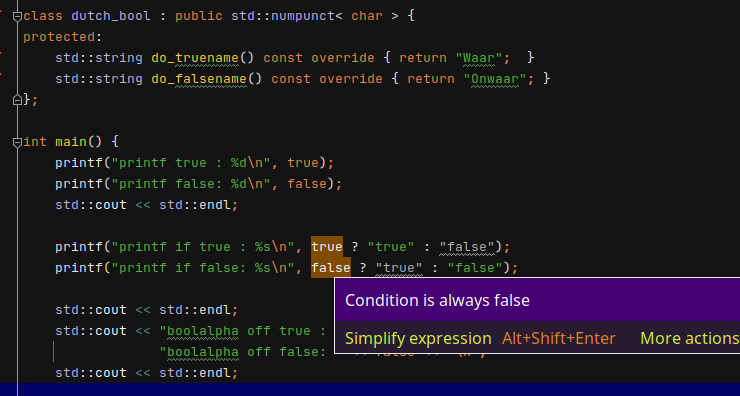

Three ways to print booleans as 'True' or 'False' in C++
source link: https://raymii.org/s/articles/Print_booleans_as_True_or_False_in_C++.html
Go to the source link to view the article. You can view the picture content, updated content and better typesetting reading experience. If the link is broken, please click the button below to view the snapshot at that time.

Three ways to print booleans as 'True' or 'False' in C++
Published: 21-03-2021 | Author: Remy van Elst | Text only version of this article
In this article I'll show you three ways to print a textual representation of a boolean in C++. Normally a bool is printed as either a 0 or a 1 by std::cout, but more often than not, if you're printing a bool, it's better to see true/false. Imagine reading through lines and lines of boring, repeating log files, how easy is it to miss a 0 in a sea of 1's? I've been there many times, wishing for more verbose logs.
I'll start with a simple printf with a ternary if e.g. (a ? this : that) and continue on to std::boolalpha. The latter one is more flexible and allows you to set different values to be printed, for localization, and can even be used to parse input streams. That means, the string true false results in two booleans, the first being, well, true and the latter, surprisingly, being false.
Consider sponsoring me on Github. It means the world to me if you show your appreciation and you'll help pay the server costs.
You can also sponsor me by getting a Digital Ocean VPS. With this referral link you'll get $100 credit for 60 days.
clang-tidy wasn't having any of it when I was working on the code examples
for this article:

Reminds me of this comic from CommitStrip, I'm watching you!:

printf with a ternary if
The simplest solution, just using good old printf. For your one off logging
statement, or poor mans debugging, probably just fine.
If you pass a bool to printf, you must use %d as the format specifier.
There isn't one for bool's, but %d works because any integral type
shorter than int is promoted to int when passed to printf()'s variadic
arguments:
printf("printf true : %d\n", true);
printf("printf false: %d\n", false);
Output:
printf true : 1
printf false: 0
Add a ternary if statement and change the format specifier to %s
and, as if it were magic, true or false ends up on your terminal:
printf("printf if true : %s\n", true ? "true" : "false");
printf("printf if false: %s\n", false ? "true" : "false");
Output:
printf if true : true
printf if false: false
On a personal note, I dislike these ternary if, also called shorthand if, statements. They do not help for readability and I'm a firm believer that code is meant to be read by other programmers, not by compilers, so readability is a big thing. Shorthand if's might save a few characters, but boy do I dislike them.
std::boolalpha
std::boolalpha works with the input and output stream functions and can be
found in the <iomanip> header. Use is simple, if you're familiar with
std::setprecision or std::setw, this is basically the same.
Printing a bool without the I/O manipulator active results in just 0/1:
std::cout << "boolalpha off true : " << true << "\n" <<
"boolalpha off false: " << false << "\n";
Output:
boolalpha off true : 1
boolalpha off false: 0
Adding std::boolalpha to your output stream will by default
print true/false:
std::cout << std::boolalpha
<< "boolalpha on true : " << true << "\n"
<< "boolalpha on false : " << false << "\n"
<< std::noboolalpha;
Output:
boolalpha on true : true
boolalpha on false : false
As you can see you must also turn the flag off (via std::noboolalpha). But
what if you code in Dutch, or any other language, and want to have Waar or
Onwaar printed instead of true and false? Or even simpler, just capitalize
the words, True and False? Well dear reader, continue on to the next
paragraph where I'll cover all facets of std::numpunct.
Something other than true or false?
As we just said in the previous paragraph, what if you want to print something
other than true or false? Localized or capitalized output? You can define
a custom facet for std::numpunct. A facet is a class describing a locale
feature set associated to a specific cultural aspect.
The facet std::numpunct encapsulates numeric punctuation preferences. Stream I/O operations use std::numpunct through std::numget and std::numput for parsing numeric input and formatting numeric output.
One thins to note is that as of writing this article, std::locale::facet use
their own method for reference counting. Not unlike a std::shared_ptr,
but not exactly the same either. In the below example you'll
By overriding the functions do_truename() and do_falsename() in
std::numpunct you can specify which strings are returned when
std::boolalpha is active. After that, you use std::cout.imbue() with a
std::locale object to replace the current locale.
Below is an example:
#include <string>
#include <iostream>
#include <locale> //numpunct
#include <ios> //boolalpha
class dutch_bool : public std::numpunct< char > {
protected:
std::string do_truename() const override { return "Waar"; }
std::string do_falsename() const override { return "Onwaar"; }
};
int main() {
// new is not a memory leak here, the dutch_bool object is
// implicitly reference counted and it will be destroyed
// when the last std::locale referencing it goes out of scope.
std::cout.imbue(std::locale(std::locale(), new dutch_bool));
std::cout << std::boolalpha
<< "NL boolalpha true : " << true << "\n"
<< "NL boolalpha false : " << false << "\n"
<< std::noboolalpha;
return 0;
}
Output:
NL boolalpha true : Waar
NL boolalpha false : Onwaar
Home | About | All pages | Cluster Status | Generated by ingsoc.
Recommend
-
 74
74
Store a associative array of booleans in the database efficiently using binary numbers.
-
 30
30
一道简单的判断题,参与者10余人,但是只有一人回答对了,所以我决定写篇文章 同事:true || false && false,这道题结果是啥 我:true 同事:执行顺序是啥 我:&&的优先级比较高,所以 false &
-
 50
50
[ Date Prev ][ Date Next ][
-
 26
26
Awaitables are the types on which await can be called. It happens due to “duck typing” – the only thing which makes type “awaitable” is an existence of the GetAwaiter() method that returns t...
-
 13
13
Python中True和False的含义.md 2019-11-20
-
 5
5
Generating a Random True or False Boolean Value by kirupa | filed under JS Tips and Tricks
-
 11
11
Python中的True和False总是让人困惑,一不小心就会用错,本文总结了三个易错点,分别是逻辑取反、if条件式和pandas.DataFrame.loc切片中的条件式。1.True和False的逻辑取反在对Tru...
-
 13
13
奇怪的Java题:为什么128 == 128返回为False,而127 == 127会返回为True? – Android开发中文站 你的位置:Android开发中文站 > Java基础 &g...
-
 8
8
V2EX › 程序员 🐒: if (a == 2) return true else return false
-
 5
5
今天跟大家聊一个有趣的话题,在Java中两个Integer对象做比较时,会产生意想不到的结果。...
About Joyk
Aggregate valuable and interesting links.
Joyk means Joy of geeK